Parents have mixed feelings about sending kids back to school; students at some private universities call for discounted tuition
Many countries are experimenting with how to reopen their schools after a coronavirus quarantine. Israel is among those gradually allowing certain age groups to return and waiting to see if there will be a surge in the number of COVID-19 cases.
Some pupils in the first through third grades as well as those in the 11th and 12th grades were allowed to return to school on Sunday.
“In countries preparing the educational system to return to normalcy, you will see two different trends,” an Education Ministry official told The Media Line.
“One is to bring back the kids from the lower grades in primary school and the kindergartens, so the parents can go back to work. In the second trend, the first [pupils] to go back are those who need to take final exams, those in their last year of high school, technical and vocational school,” she said. “What we did here in Israel is a combination of the two.”
However, larger cities such as Jerusalem chose to keep the schools closed. The official explained that “most of the municipalities that did not open [on Sunday] said it was because they were not prepared; they had to do all kinds of things like cleaning schools.
“Some of the high schools have a personnel problem,” she said. “The primary schools are controlled by the Education Ministry, so we can put teachers in schools where they are needed.”
“Most of the schools that did not open will reopen by Tuesday,” she added.
According to a second Education Ministry official, 1,500 elementary schools have opened to students in the first three grades. Of their 300,000 pupils, 180,000 returned.
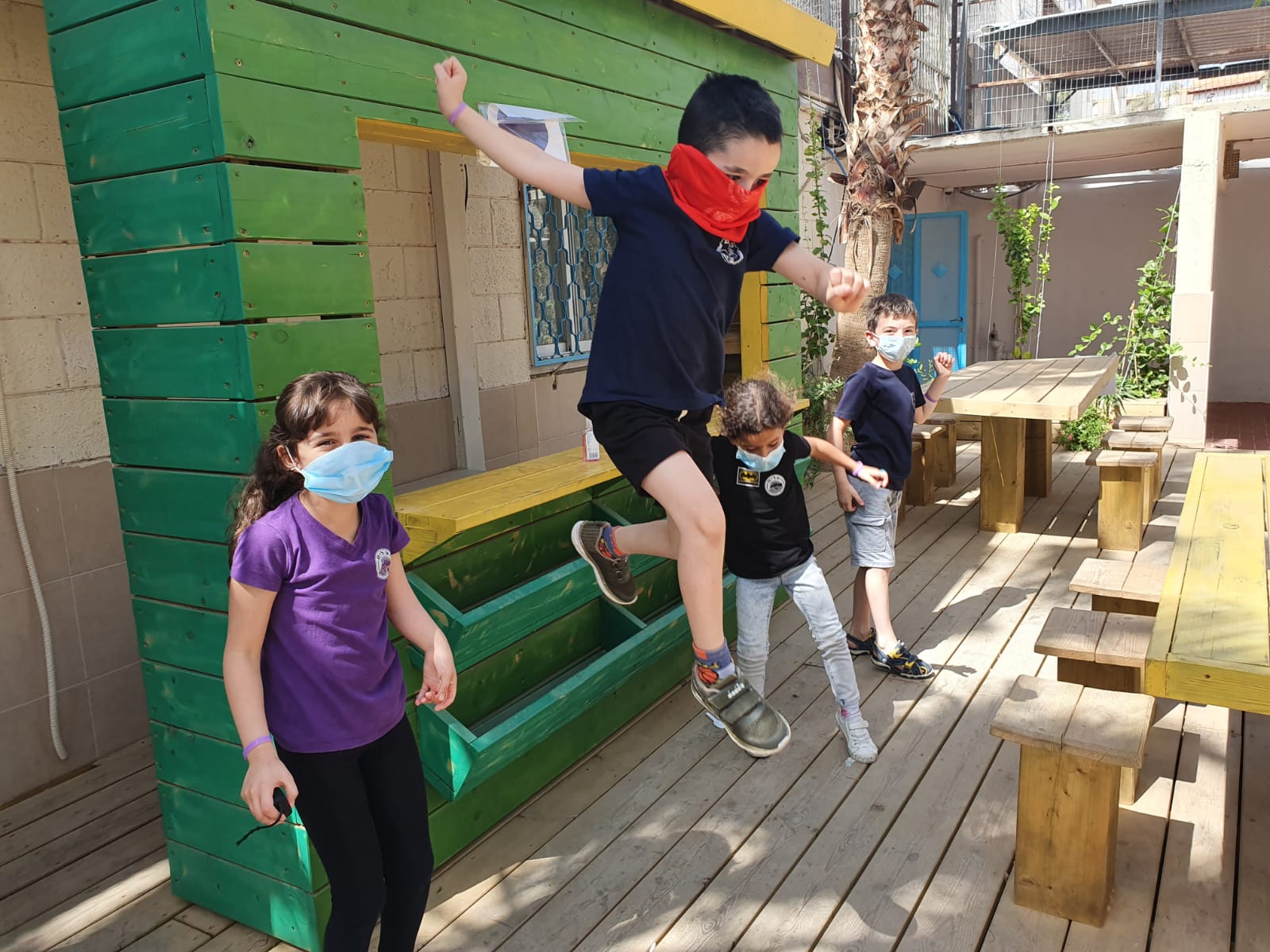
Children playing at Ye’elim Elementary School in Eilat, Israel, May 3, 2020. (Israel Education Ministry)
The 11th and 12th grades must open by Tuesday, although the first official from the Education Ministry said that there will be no penalty for schools that do not open and parents who do not want to send their children.
Libby Jean, a Jerusalem mother of a 7-year-old and an 8-year-old OK with sending them to school. “I think I might be more liberal than most people. I feel that the world is turned upside down and that people are getting overly hysterical or fearful over something that isn’t even affecting the majority of people,” she told The Media Line.
Yizhar Baumer, a father of three and a member of the Jerusalem Parents and Teachers Association, is fine with his children returning.
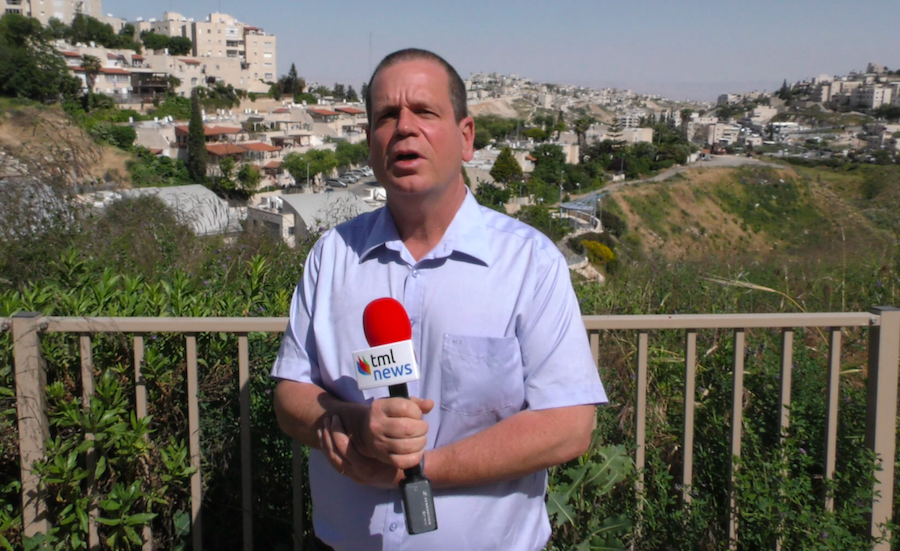
Yizhar Baumer speaks to The Media Line in Jerusalem, May 4, 2020 (David Rawlings/The Media Line)
“It’s about time,” he told The Media Line. “As soon as we can get back to a normal routine, the better it is for everyone.”
“Because I sit on the school’s parents’ board, I know the [school officials] are serious and not playing around,” he added.
Baumer says the biggest issue is the transportation of high schoolers to and from school. Younger pupils tend to not use public transportation to get to school, which is also mostly shut down.
“We probably need to arrange some kind of shuttle or have a few parents carpool in larger groups to take kids,” he said.
While Baumer feels confident about sending his children back to school, he understands why parents might decide not to permit their children to return.
“Imagine yourself in a family where the grandparents live in the same house or a there’s family member whose immune system is compromised, such as someone fighting cancer. There are families with very justifiable reasons for minimizing exposure,” he said.
As for other grades, the first Education Ministry official says the goal is to open kindergartens by the start of the next week, which in Israel is on Sunday.
This does not sit particularly well with Missy Schlade, a mother of a 5-year-old and a 6-year-old who lives in the Jerusalem neighborhood of Nahlaot.
“I am very wary of the idea. Knowing how easily lice spreads in kindergarten in this country, I can’t imagine a ‘hotter spot’ to be sharing air,” she told The Media Line. “I’ll probably wait a week or two. Everyone is confused right now and it seems like a drastic step to send the kids back to school suddenly.”
For the ultra-orthodox, or haredim, a community especially hard hit by the coronavirus, children in grades seven to 10 are allowed to return if their institution can meet the ministry’s safety criteria, including smaller class sizes and social distancing.
“We took into consideration the needs of this specific sector, their needs and way of teaching is unique,” she told The Media Line.
Yisrael Campbell, a father of four schoolchildren – a fourth grader, an eighth grader and two 10th graders, has mixed feelings about them returning.
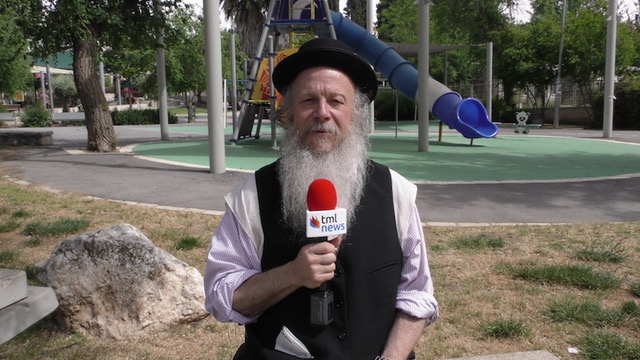
Yisrael Campbell speaks to The Media Line in Jerusalem, May 3, 2020 (David Rawlings/The Media Line)
“In terms of safety, I would like to believe they have a sense of what they’re doing, how they will do it and what it will mean for everybody,” he told The Media Line. “There is a sense here in Israel that until the kids go back to school, the economy can’t really open, which is crazy but seems to be the reality.”
“It’s definitely a mixed bag of ‘God, it would be nice to have them out of the house’ and ‘I think it would be good for them to interact more with their friends,’” said Campbell, whose children go to religious public school, as opposed to secular public school or a haredi school.
“On the other hand, kids in general, and I think Israeli kids in particular … social distancing isn’t going to be in their DNA for very long. … As a culture, we’re not really attuned to personal space. And certainly, something we can’t even see is not going to lead us to have a greater appreciation” of it, he said.
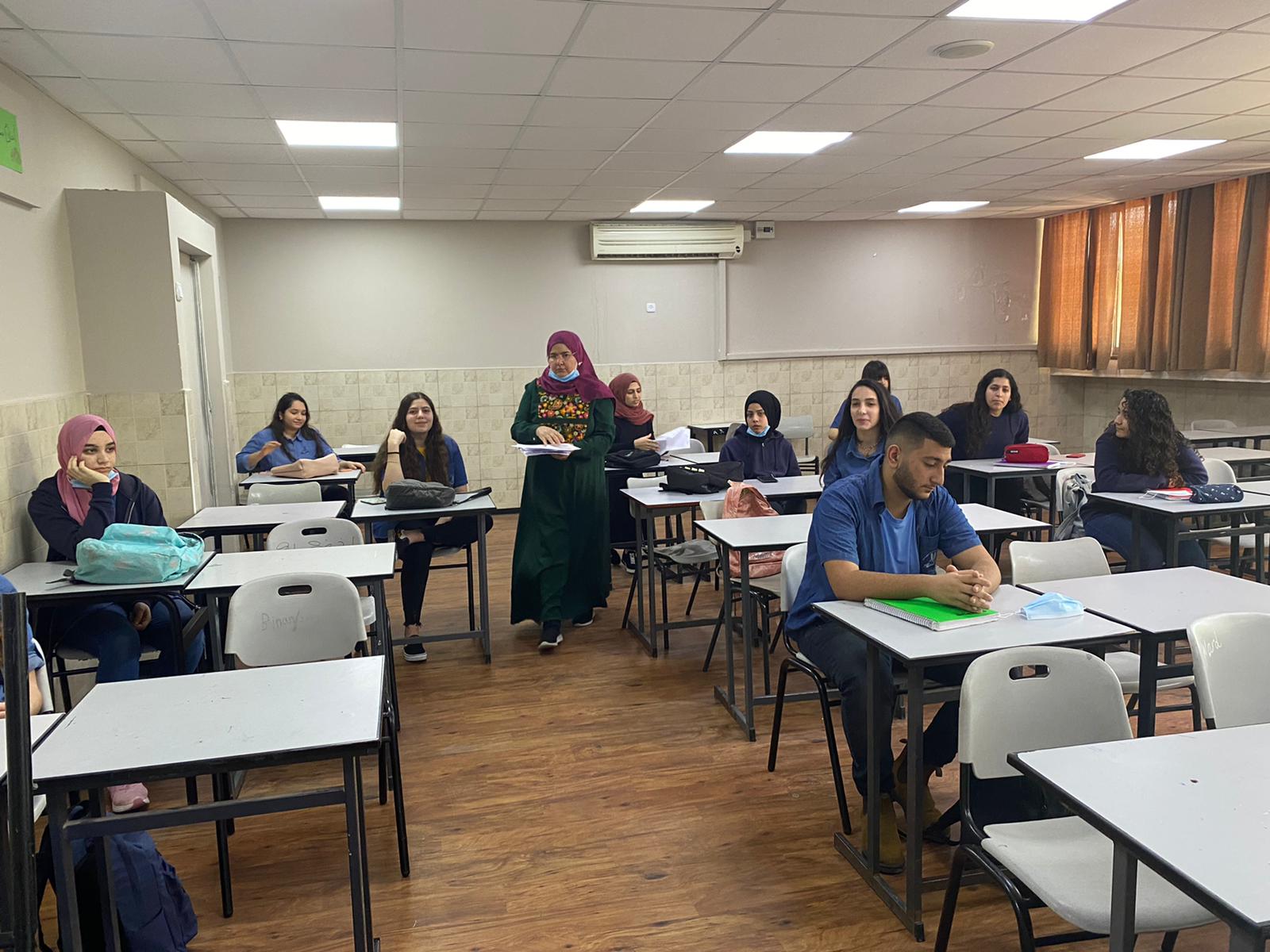
High schoolers learn at a safe social distance at the Yama School, in Zemer, Israel, May 4, 2020. (Israel Education Ministry)
“In retrospect, we’re going to feel and see that the easiest part of this was when nobody was doing anything and that the in-between space is going to be much harder to navigate.”
Lauren Adilev, owner of boutique content agency Turn Write This Way, said she also feels that while social interaction would be good for her son, an 11th grader in Efrat, keeping schools closed may be necessary.
“If he needs to stay home for the good of public health, that’s fine, “ she told The Media Line.
Adilev says her daughter, a 12th grader who normally attends school near Jerusalem, has benefited from staying home.
“This situation has been a gift for her. Instead of schlepping to school, learning all day and then studying for exams, Meira is doing exercises and tests, attending Zoom meetings for her graphic design classes and taking lessons online,” Adilev said. “She’s doing well and I think that she should continue this way until the end of the year.”
For Israeli Arabs, most of whom study in Arabic, school opened for the last two grades of high school today. The Education Ministry has a more gradual back-to-school plan for Arabs, many of whom are observing Ramadan, a month in the Islamic calendar when they fast during the day.
“They normally have a reduction in hours and classes because of the fast,” the first official said. “The Arab community [here] was affected by COVID-19 very late compared to the general population. It started only two, two-and-half weeks ago in their community, so the ministry decided to give them more time, to help them cope.”
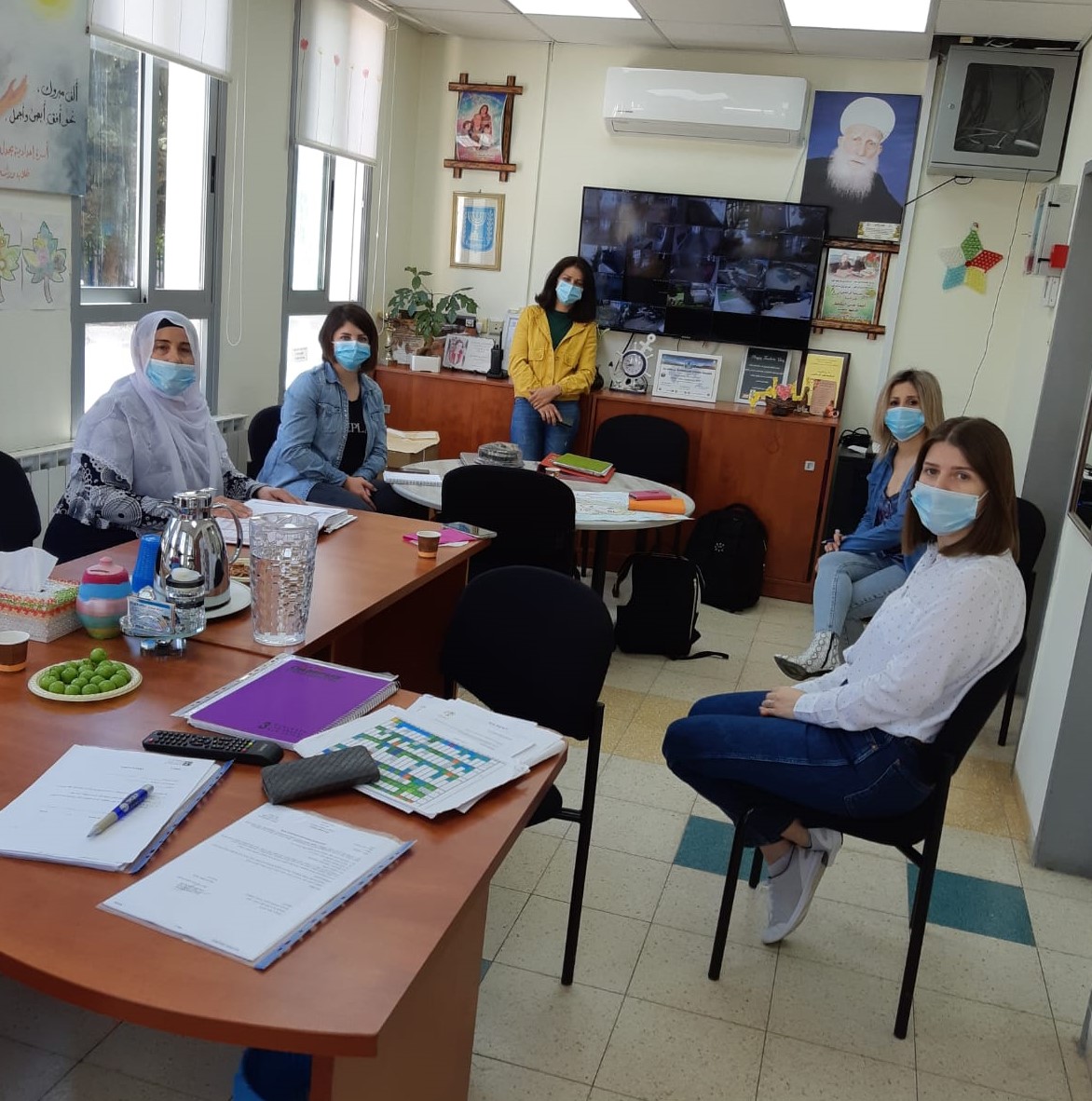
Mas’ade High School in the Golan Heights, May 3, 2020. (Israel Ministry of Education)
The economic impact of coronavirus affects everyone, but college students are particularly hard hit. This is especially true of private college students in Israel, who have organized to have their tuition lowered.
Bat-El Satloff is part of the 2,200-member “We are not willing to pay” group that started about two months ago at the Interdisciplinary Center Herzliya (IDC) college. Like many of her classmates in the group, the second-year communications student has not paid the full amount of tuition.
“Corona brought us, especially the IDC students and their parents, financial hardship. We are having a hard time paying the highest tuition in Israel.”
“IDC communications students pay an extra $2,500 dollars a year for equipment such as cameras and software in technical rooms but we don’t have access to it right now. While we are on campus, we also pay for water, electricity, security and cleaning services,” she told The Media Line.
“We are not there. Why should we pay for that? The teachers and the administration had to take a cut in their monthly salaries. So, the question is, why don’t we get a reduction in our tuition payment? … We are not against the school; we just want them to work with us.”
Raz Granot, who is also in the group, agrees: “If we are Zooming, we are just like any other university,” he told The Media Line.
Granot says the group sent an email to the university’s president about reducing tuition in early April and received response a few days later stating that the school will get back to them. He says they have not heard anything more.
Granot says the group will continue to pressure the administration and is considering further steps if they do not receive a response.
He is opposed to the school’s offer for students to take out additional loans or defer payments for tuition.
“Some students are not willing to take out loans or to push off payments because it just doesn’t make sense. If we don’t have the money now, how are we going to pay for it later?”
Because Satloff has not paid her full tuition, she will not be able to take her final exams.
“Most of the students are probably not taking exams this semester, and it’s OK, we can take them for free next semester because next [school] year we will probably pay the full amount. But, we’re not going to complete this payment,” she said. “It’s just not fair.”
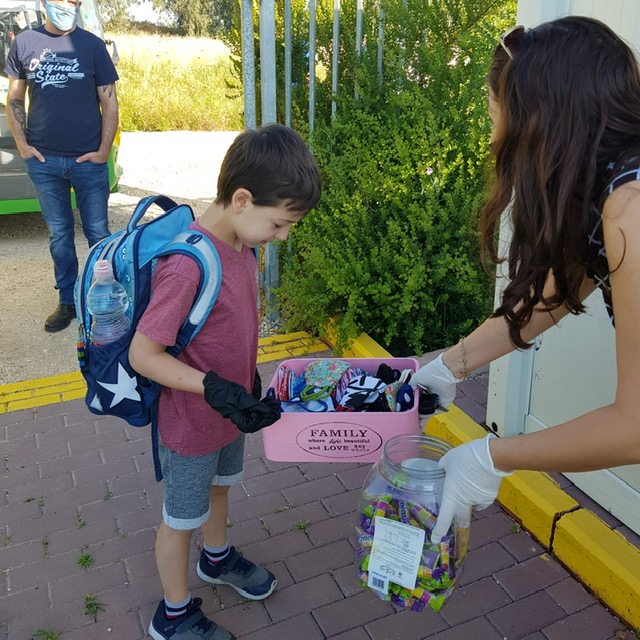
A boy receives a mask and gloves as he enters the Gilboa School in Beit Alpha, Israel, May 3, 2020. (Israel Education Ministry)
A spokesperson for IDC Herzliya responded by email:
“Since the outbreak of the corona crisis, IDC Herzliya has invested tremendous resources to meet its primary commitment [and enable] study online, so that students do not miss the semester and their undergraduate studies are not negatively affected.
“All programs were transferred to online teaching, lecturers underwent special training and a dedicated technical-support system was established. In addition to classes and lectures, students receive all their additional services remotely: library services, psychological counseling and more. Both the academic and administrative staff that provide campus services work from home and respond to students.
“Alongside the recent considerable investment in remote-learning infrastructure, there was a decline in the institution’s various income streams, which are immediately affected by the economy and markets.
“Thus, a tuition reduction is not possible. However, as Professor Uriel Reichman, IDC’s president and founder, announced, any student who is having significant financial difficulties should contact the tuition department for help.
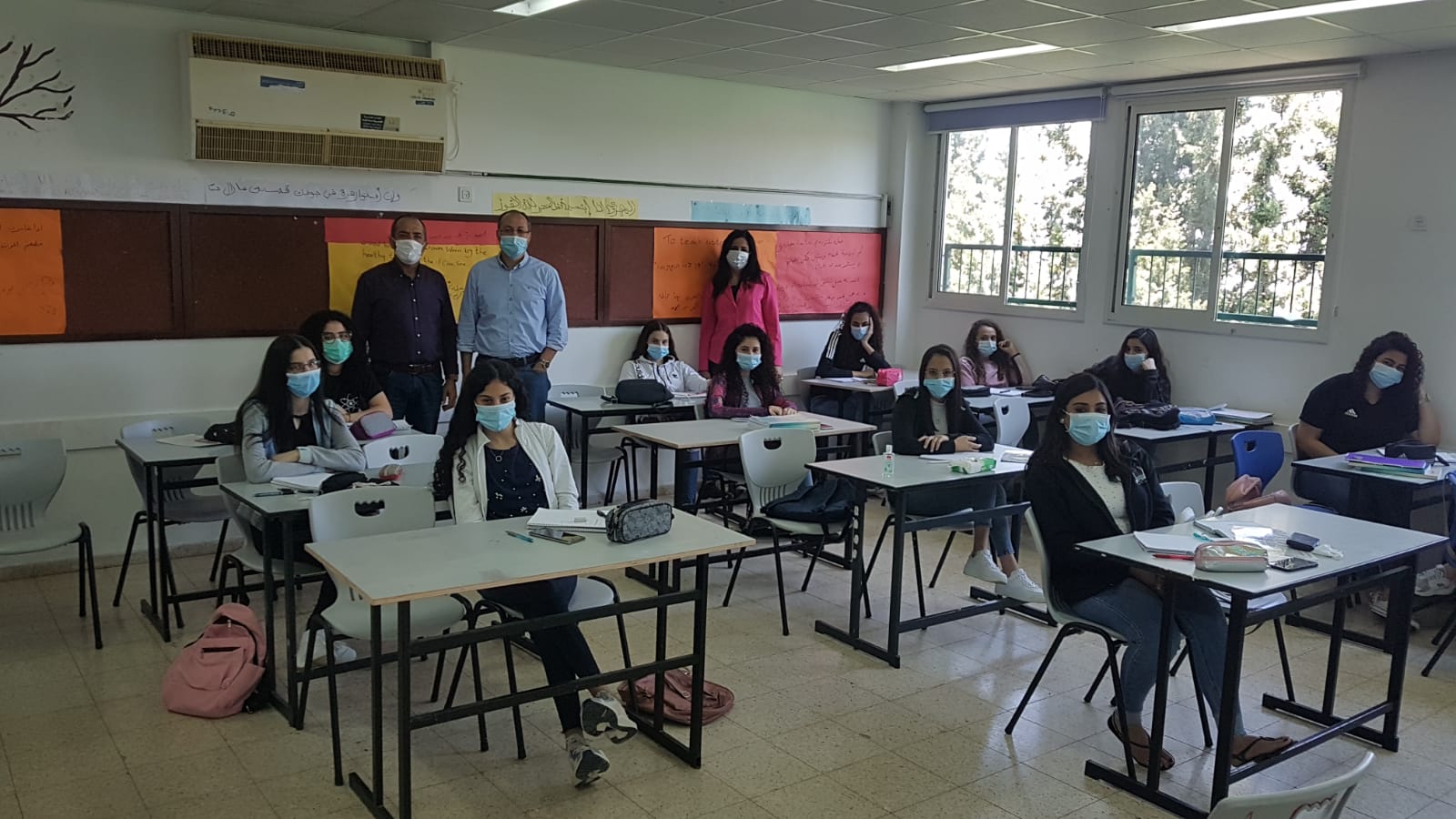
Students and staff return to the classroom at Hashalom School in Sheikh Danun, Israel, May 3, 2020. (Israel Education Ministry)
“In light of the COVID-19 crisis and the financial difficulties that some students are facing, IDC Herzliya has been examining ways to help students who are in financial distress and struggling to keep up with their tuition payments.
“To this end, IDC has reached an agreement with the Sachal Fund, under which IDC will subsidize the interest on special loans for students who have to make tuition payments and who have been placed on unpaid leave [or one of their parents is on unpaid leave]. The loan will be up to 20,000 shekels [about $5,700] and can be repaid in 36 installments,” the email said.
Another option that will be offered to students in need is the deferral and spreading of their remaining tuition payments over several months, it added.
Riki Davies, a student at the Reidman International College for Complementary and Integrative Medicine branch in Jerusalem, is part of a group at her school trying to get a reduction in tuition.
“We are now all in online school, which personally doesn’t work for me. We asked for a discount, but we haven’t heard from them,” she told The Media Line, saying that students have to prepay their tuition.
Davies would like to either redo the semester or get a partial refund. She said she would also like to get a discount on next year’s tuition.
“I think that in general it’s extremely unfair,” she said. “More than half of the students aren’t working, and they’re still pulling enormous amounts of cash out of our bank accounts.”
Reidman College did not respond to an email or a Facebook message asking for a comment.
University classes are remaining online for now.
When asked whether grade schools would be shut again if there is a dramatic increase in COVID-19 cases, the first Education Ministry official said: “We don’t know. We don’t know what the future is.”